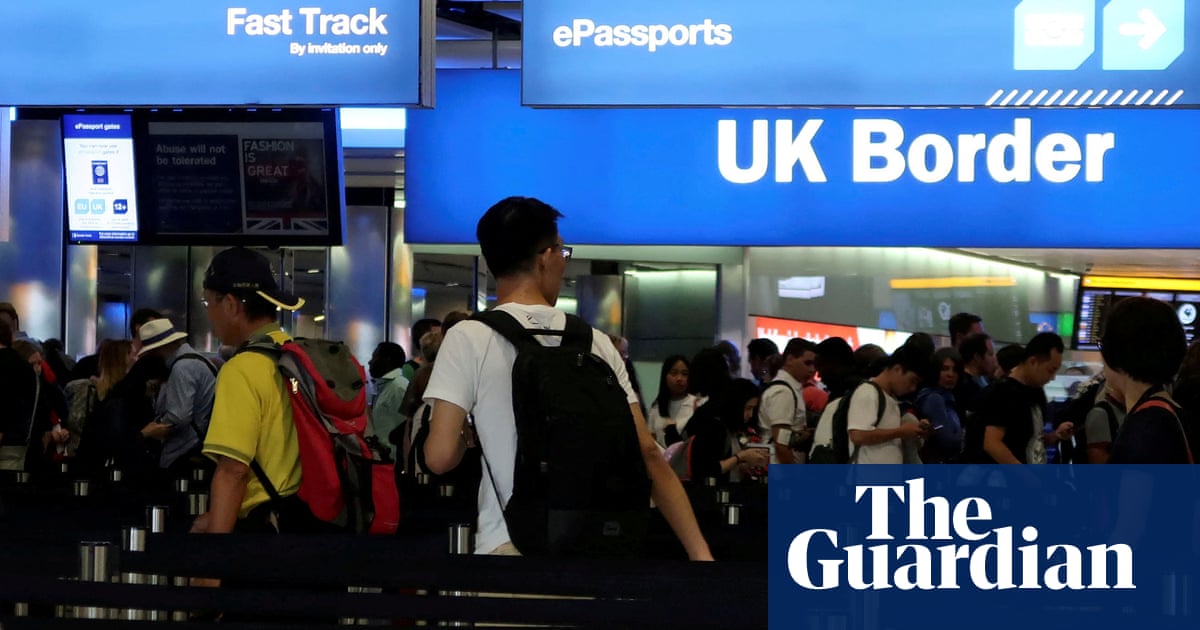The Home Oficehas releasedits much-trailed policy paper on immigration, which Keir Starmerhas promisedwill lead to the numbers of people arriving in the UK falling “significantly” by the end of this parliament. Here is what it sets out and the measures the government is taking.
For a departmental policy document, there is quite a lot of politics, including forewords from Starmer and Yvette Cooper, the home secretary, both of whom make the argument for reducing numbers – though without setting out any specifics for this reduction.
Starmer castigated what he called “a one-nation experiment in open borders” under the Conservatives, with net migration peaking above 900,000 a year in 2023. He and Cooper both said this had placed pressure on public services without helping economic growth.
One of the key changes is to tighten up the rules on which qualifications people need to get a skilled work visa. Currently, these need to be at least at the level of what is known as regulated qualifications framework (RQF) 3, roughly equivalent to A-levels. This will be changed to RQF6, which is degree level.
Skilled worker visas will still be issued for jobs assessed at RQF3-5 but only on a time-limited basis and if the government’s migration advisory committee deems that there is a shortage of domestic staff. Industries that do this must demonstrate that they are taking steps to try to plug the recruitment gap.
These would already be affected by the changes to skilled visas, but more specifically the white paper promises to end all overseas recruitment for social care work – although there will be a “transition period” until 2028 where visas can be extended and overseas nationals already in the country can switch to a social care job.
While this is being promised alongside separate pledges to overhaul social care and make it a more attractive option for UK workers, some groups in the sector are worried this could cause further staff shortages, which could affect the care available to people.
One of the other big drivers in rising net numbers in recent years has been students, and while this area is economically hugely important – the white paper cites an estimated £20bn annual contribution to the economy – ministers are planning significant changes.
Given what the paper cites as worries that too many students are arriving to study at lower-ranked institutions, and often staying in the UK beyond their course, what is known as the basic compliance assessment for sponsoring institutions is being tightened up, with tougher targets for the percentage of visas grants and the proportion of students who enrol and then complete their course.
There is a parallel pledge to review another route for overseas students: those who arrive to take a shorter-duration language course.
These will be made generally more rigorous and there will be new requirements for people to show progression in their English proficiency over time if they apply for visa extensions or settlement.
As part of this, all adult dependants who come with arriving workers or students will need to show at least basic English skills, and to progress.
Under the changed rules, people will need to have been in the UK for at least 10 years, rather than the current five, before they can seek settlement, also known as indefinite leave to remain. This has been criticised by some as making it harder for arrivals to fully integrate into UK life.
A number of measures in the paper relate to making it easier to remove arrivals who have committed crimes, particularly if they are on short-term visas.
Currently, only those who are jailed for a year or more are considered for deportation. This will now be an option for all offences, particularly sexual offences. Part of this will involve seeking to “clarify” how article 8 of the European convention on human rights, which allows people to appeal on the basis of their right to a family life, is applied to immigration cases in the UK.
One specific in the document is a 32% increase in the so-called immigration skills charge, paid by employers (barring certain professions such as research scientists) when they take on someone from overseas via a skilled visa or similar route. The paper says this has not been increased since 2017, so the rise is in line with inflation.
To better monitor arrivals and have improved measuring of numbers, a new electronic identity system for overseas nationals will replace the current system of biometric residence permit cards.
